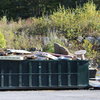2017 Berne election: Joel Willsey for council
BERNE — Joel Willsey has helped with projects in his hometown of Berne for years, but now is looking to become part of Berne’s government.
A Democrat, Willsey is running on the Democratic line for town board
Willsey, 60, has lived in Berne all his life. He attributes his 34-year career with the state’s Department of Transportation in part to his education at Berne-Knox-Westerlo High School, where he took a class on mechanical drawing. After working at machine shops and other area businesses after high school, he took a state test and started as Grade 5 state employee, eventually working up to his present position as a Grade 20 employee.
He has worked as an engineer technician and drafter, a project designer, and reviewed bridge and highway designs in quality control.
Willsey has assisted with town projects, including helping find a site for the Berne Library, redesigning the town’s transfer station, and serving as the town’s recycling coordinator. Such tasks included looking at zoning and other aspects of the makeup of the town and the process of administering projects.
“One of the things that has helped me,” he said, “I’ve gotten very familiar with how things are operated as a volunteer.”
Willsey later added that he felt his experience will help him serve as town council member.
He said he would like to revisit issues he dealt with as recycling coordinator, such as reducing waste by recycling and composting.
Willsey said he became involved in the town government after he was told that an unregistered vehicle on his property was in violation of town code.
“I was kind of a complainer,” he said, explaining how he approached the town board about it.
“I began to appreciate what they’re up against, and how difficult the job really is,” he said, of the town board. He added that he decided, if he were going to complain, he should at least help out.
“My goal is to the best job I can,” he said, of serving on town board.
Willsey, who has written of the highway department’s closure of an entrance onto Stage Road in letters to the Enterprise editor, said his concerns are because the remaining entrance “blows shut” from snow, and is near where his elderly father lives.
Willsey said he has concerns about the highway department regarding traffic safety and keeping road signs in clear view. He suggested taking an inventory of signs to determine if one is missing.
“We need to really train the road crews,” Willsey said, “for their own protection and the protection of the public.”
Regarding consolidation of the town and county highway garages, Willsey said that he is not sure what it entails as the study on its effects has not been completed.
The town should continue looking into the issue and guide it, he said.
“Berne should be at the table, representing the interests of the people,” he said.
He added that a crew of town workers — “at least the size it is now” — should stay in Berne.
Regarding a shared facility, Willsey said he would have to look into what the recommendations for what the plan are, and what would best save the town money.
Willsey said he has seen little attempts for the highway department to compromise on conflicting opinions on highway autonomy, and that is in part to gain political notoriety.
“I think it should be nailed right down and documented,” he said, of the policy on highway autonomy in the town. He suggested using an attorney specializing in highway law to determine this.
“It really shouldn’t be such an issue,” he said. “These people should be able to work together.
Willsey later added that he feels the highway department’s social-media page should be eliminated, because it is not sanctioned by the town. He said that the page had misleading statements on it, such as suggesting that only himself rather than a group of people wanted to keep Stage Road open.
He said he does not have an issue with the four-day, 10-hour work week for the highway workers, but that it should be only during eight weeks in the summer.
Willsey said that discussions of the Rapp Road landfill closing date back to the early 1990s.
“This has been a recurring thing for many years,” he said. “I believe it this time.”
He said that the town will have to try to reduce its waste with methods such as composting and recycling. Once the landfill closes, he said, an option may be shipping waste by rail or a municipal transfer station. The landfill in Colonie could be another option, but the tipping fees are costly.
“We want to get anything heavy out of the waste stream … ,” he said, “because we have to save money.”
Although he said Berne is making efforts now, the town will have to start scrutinizing the weight of its waste soon. One option could even be having residents put food waste in a garbage disposal in the sink, to send it into the sewage system rather than the waste stream, although it would depend if that could be handled by the sewage system.
“There isn’t anything that is going to solve the whole problem,” said Willsey. “You don’t have to put your eggs in one basket.”
He added that he could offer his experience at the transfer station to assist in this situation. He had instituted collecting and source-separating recyclables before commingled recycling was put in place.
Regarding the question of offering insurance to domestic partners, Willsey said that the insurance offered to former town employee Scott Green’s partner was given by accident. However, he added that he didn’t see why the town shouldn’t offer benefits to unmarried dependents.
“I don’t see a reason why not to do it in the future,” he said.
Willsey said that the town should avoid ever going above the state-mandated tax cap.
“I think you have to look at why it’s happening,” he said, of the situation that would lead to such a tax increase being necessary. “It’s hard to come up with an opinion on a hypothetical like that.”
“I don’t foresee it happening,” he said.
Willsey said that business and agriculture in Berne has become a common topic of concern among people he has spoken to.
He said that trying to “shoehorn” business into one commercial district will not work for the various businesses in town.
“You would think that, with all the open space, it would be easy to find a place for a business around here,” said Willsey. “The truth is, it’s not.”
He noted that, when trying to site an area such as for the Berne Library, he encountered setbacks, floodplains, bedrock, wetlands, and other elements that can make it difficult to find a spot for a new business.
However, Willsey said that he discovered many small, unknown businesses in Berne. He and other candidates agree that something like a map or business directory could make these businesses better known in the Capital Region, he said.
These small businesses also do better than large businesses in a town like Berne, he said, although a small convenience store or shop supported by a chain could come into the town. He noted, though, that people become concerned about protecting businesses already in Berne when such businesses are looking to come in.
“I think we need to look at the zoning and be a little more lenient with people who want to distribute businesses to other areas,” he said.
Willsey added that there are also loans and programs out of Albany that can help businesses.


